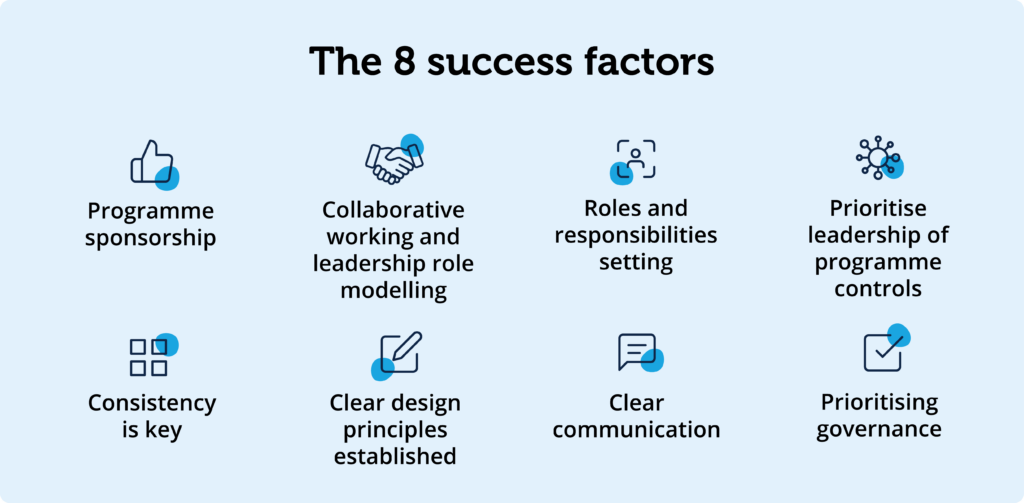When moving your Enterprise Resource Planning (ERP) system from on-premise to the cloud, what are the key factors to ensuring success? How can you ensure the programme stays on time and to budget? We’ve talked in other articles about the importance of ‘Adopt Don’t Adapt’ in successful ERP programmes, and good governance is at the heart of succeeding with this philosophy.
In this blog, Socitm Advisory’s Head of ERP Delivery, Jess Browne, talks about the importance of good governance and what good looks like.
Ensuring effective governance throughout the implementation of an ERP programme is critical for success, particularly in the context of adopting the new system rather than adapting it through customisation.
So, what does good governance in an ERP programme look like?
Good governance entails several key factors, each crucial for steering the project in the right direction to maximise its benefits.

1. Programme sponsorship
Set up your programme sponsorship right from the outset as this will provide the foundations for the programme; the leadership, support and resources to ensure the project stays on track and receives the necessary attention and priority.
2. Collaborative working and leadership role modelling
If you establish collaborative ways of working and leadership role modelling from the start of the programme, this sets the tone for effective governance. This involves fostering collaboration across different service areas such as HR, finance, payroll, and procurement, as these departments will need to work closely together and make significant decisions collectively. Leadership should exemplify an agile approach, being adaptable to unforeseen challenges and changes that may arise during the implementation process.
3. Roles and responsibilities setting
Clearly define roles and responsibilities from the outset, both internally within your organisation and in the governance structure involving external suppliers, such as your systems integrator, software vendor and a strategic partner or business integrator, like Socitm Advisory. This clarity ensures accountability and empowers project team members to make decisions at the appropriate level, rather than everything being escalated upwards.
4. Prioritise leadership and programme controls
Define clearly your approaches and processes for risk management, change control management, resource management and quality assurance; this is key to successful programme delivery. Consider your approach to this carefully, our advice is to ensure you have a mature approach, as these are not admin tasks, they are important for good programme governance.
5. Consistency is key
Consistency in governance throughout the programme is crucial to avoid disruptions caused by personnel changes or shifts in leadership. You should maintain a steady approach, aligned with the initial design principles set at the beginning of the programme, to ensure continuity and adherence to the project’s vision.
6. Clear design principles established
Set clear design principles early in the process; this is fundamental. These principles guide decision-making throughout the programme, ensuring that any changes or adaptations remain aligned with the overarching goals and objectives. If you wait until implementation to establish governance and design principles, you risk inefficiencies and inconsistencies that can hinder progress.
7. Clear communication
Transparent communication is critical to building trust and keeping all stakeholders informed. Within this, you should consider regular updates on project progress, challenges, and decisions.
8. Prioritising governance
Ensure you prioritise governance! If you fail to prioritise it, this could have severe consequences for your organisation. It can lead to reputational damage, financial implications, and project delays. With ERP programmes often costing millions, the stakes are high, so making sure governance is effective is imperative for success.

Good governance in practice in Norfolk
Norfolk County Council stands out as an example of effective governance in ERP implementation. By prioritising governance from the outset, adhering to design principles, and maintaining consistency throughout the programme, they ensured a successful transition to a cloud-based ERP system.
Achieving good programme governance
To achieve good programme governance, you should consider it early in the process, from the development of the outline business case through procurement and preparation phases. Allocating resources, upskilling where needed and potentially partnering with experienced consultants like Socitm Advisory can provide invaluable support, offering expertise and guidance to navigate the complexities of an ERP implementation.
In summary, good governance is one of the cornerstones of a successful ERP programme. By prioritising collaboration, clarity, consistency, and adherence to design principles, you can mitigate risks, maximise benefits, and ensure the effective delivery of your ERP programme.

Get in touch or book a meeting with our Account Director, Chris Batt, to discuss your options
